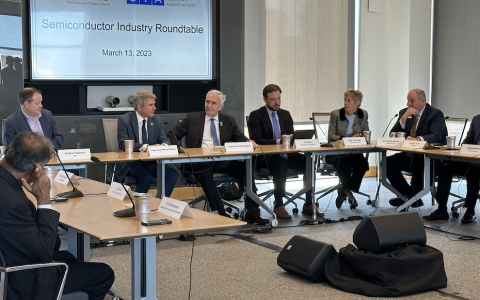McCaul Hears from Semiconductor Leaders at UT Austin Roundtable
Industry leaders from across Texas praise McCaul’s CHIPS for America Act, which was signed into law in August of 2022
AUSTIN, Texas – This week, U.S. Congressman Michael McCaul (R-Texas) participated in a roundtable hosted by the University of Texas at Austin, focused on how his CHIPS for America Act will continue to boost Texas' leadership position in the semiconductor industry. Rep. McCaul was joined by UT President Jay Hartzell, the Department of Commerce’s Senior Advisor on CHIPS Implementation J.D. Grom, Rep. Lloyd Doggett (D-Texas), and industry leaders from Texas Instruments, Samsung, AMD, and several other chips-related companies.

Rep. McCaul speaks at the roundtable
Excerpt from Rep. McCaul’s remarks:
“Thank you for your recognition of my introduction of the CHIPS for America Act … I think no state is going to benefit more than the state of Texas from this. We already see the fruits of our labor coming out as we look at Texas Instruments [and] Samsung, of course, with a massive expansion just north of here in Taylor …
“I think this is going to be a major shift, and it’s a generational, transformational piece of legislation to make the United States safer, but also to improve our economy and jobs and manufacturing here in the United States or in our allied nations, rather than China or in countries vulnerable to the current threat from China. … That’s something I think CHIPS was primarily designed to respond to as we move forward, and it’s all about our children and the next generation and what kind of world — what kind of America — they’re going to grow up in.”
Excerpts from leaders at the roundtable on what Rep. McCaul’s CHIPS for America Act will mean for the semiconductor industry in Texas and beyond:
Jay Hartzell, University of Texas at Austin president: “Representative McCaul, who now chairs both the House Foreign Affairs Committee and the Congressional High Tech Caucus, long recognized that investing in domestic semiconductor manufacturing and reducing our dependence on foreign supply chains are national security imperatives, which is what led him to write the original chips act, the CHIPS for America Act, back in 2020. We thank him for helping craft one of the most significant pieces of federal legislation in recent memory and for the benefits we know it will bring to Texas.”
Stephen Bonner, Texas Instruments vice president of worldwide government relations: “I’d also like to say thank you to Chairman McCaul. It is remarkable that we’re sitting here with all of this having passed. I appreciate how persistent you were; I appreciate the relationships you built in order to make this happen. And when we look at [the Semiconductor Industry Association’s] list of $200 billion-worth of investment across this country, that is remarkable. We’ve heard the word ‘historic’ used a lot around the table today, and ever since this bill was signed into law last summer, that’s absolutely true. This is a huge piece of history, and it would not have happened without your leadership.”
Gene Irisari, Samsung Electronics America head of semiconductor policy: “[Congressman McCaul] knew from the very beginning how important of a constituent industry tech was to Austin and to his success, so kudos to him. … He’s been a true leader from day one — since even before he was a congressman — on tech issues and the intersection with national security, so thank you for all of your great work on that.”
Jonathan Hoganson, AMD corporate vice president and head of global government relations: “I started in this industry over a decade ago, and if I had said that we were going to come together in a bipartisan fashion and actually pass something that was going to rebuild the semiconductor ecosystem in the United States, you would have told me I was crazy. But we’re here, and we’re here because of your leadership, Chairman McCaul and Congressman Doggett. … Chairman McCaul, I want to thank you, in particular, because you were one of the first to recognize the importance of design and how critical that is in maintaining our design leadership.”
###